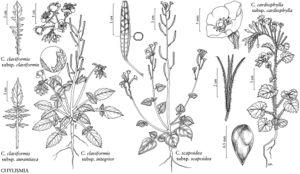Difference between revisions of "Chylismia scapoidea subsp. scapoidea"
imported>Volume Importer |
imported>Volume Importer |
||
| Line 50: | Line 50: | ||
|publication year= | |publication year= | ||
|special status= | |special status= | ||
| − | |source xml=https://xjsachs2@bitbucket.org/aafc-mbb/fna-data-curation.git/src/ | + | |source xml=https://xjsachs2@bitbucket.org/aafc-mbb/fna-data-curation.git/src/e39f0e846f172941159b2045254d62d10d9823f6/coarse_grained_fna_xml/V10/V10_652.xml |
|subfamily=Onagraceae subfam. Onagroideae | |subfamily=Onagraceae subfam. Onagroideae | ||
|tribe=Onagraceae tribe Onagreae | |tribe=Onagraceae tribe Onagreae | ||
Latest revision as of 10:33, 9 May 2022
Leaves: blade usually unlobed, rarely pinnately lobed with few, small lateral lobes, terminal lobe narrowly ovate to ovate or, sometimes, elliptic, 1–5.5 × 0.5–3 cm, margins subentire, oil cells on abaxial surface inconspicuous, usually pale yellowish brown, rarely darker. Flowers: petals 1.7–5 mm. Capsules (10–)15–30 mm. 2n = 14, 28.
Phenology: Flowering Mar–May.
Habitat: Sandy or clay flats.
Elevation: 1200–2000(–2500) m.
Distribution
Ariz., Colo., Nev., N.Mex., Oreg., Utah, Wyo.
Discussion
Subspecies scapoidea is known from western Wyoming, west to Lake County, Oregon, and Elko and White Pine counties, Nevada, south to Beaver County, Utah, northern Coconino, Navajo, and Apache counties, Arizona, Sandoval and San Juan counties, New Mexico, and western Colorado; also on the headwaters of the Arkansas River in eastern Colorado (Fremont and Pueblo counties). It is the only member of sect. Chylismia that occurs east of the Continental Divide.
Selected References
None.
